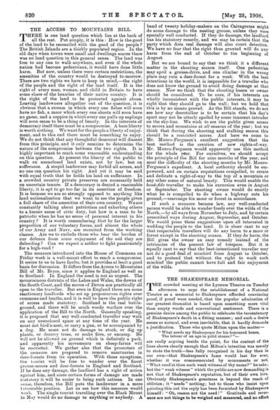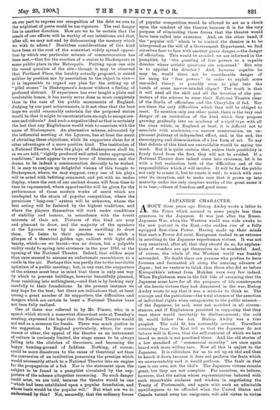THE SHAKESPEARE MEMORIAL.
THE crowded meeting at the Lyceum Theatre on Tuesday afternoon to urge the establishment of a National Theatre as a memorial to Shakespeare afforded convincing proof, if proof were needed, that the popular admiration of our greatest dramatist is based upon something more vital than empty words and conventional sentiment. There is a genuine desire among the public to celebrate.the tercentenary of Shakespeare's death in a fitting manner; and such a desire seems so natural, and even inevitable, that it hardly demands a justification. Those who quote Milton upon the matter- " What needs. my Shakespeare for his honoured bones, The labour of an age in piled stones?"—
are really arguing beside the point, for the context of the lines shows clearly enough that Milton's intention was merely to state the truth—less fully recognised in his day than in our own—that Shakespeare's fame would last for ever, whether it was commemorated by monuments or not. "What need'st thou such weak witness of thy name?" he asks ; but the " weak witness " which the public are now demanding is not that of Shakespeare's reputation, but of their own love. Obviously Shakespeare's greatness is beyond the reach of oblivion ; it " needs " nothing ; but to those who insist upon pointing this out the reply has been furnished by Shakespeare himself : " Oh, reason not the need !" Gratitude and rever- ence are not things to be weighed and measured, and no effort
on our part to express our recognition of the debt we owe to the mightiest of poets could be too vigorous. The real danger lies in another direction. How are we to be certain that the result of our efforts will be worthy of our intentions, and that, after all, we may not end by dishonouring the memory which we wish to adorn ? Doubtless considerations of this kind have been at the root of the somewhat widely spread opposi- tion by which one particular scheme of commemoration has been met,—that for the erection of a statue to Shakespeare in some public place in the Metropolis. Putting upon one side the vexed question of the site—though it may be observed that Portland Place, the locality actually proposed, is suited neither by position nor by association to the object in view— it is impossible to regard any plan for the setting up of "piled stones" in Shakespeare's honour without a feeling of profound distrust. If experience has ever taught a plain and irrefutable lesson, it has surely never done so more completely than in the case of the public monuments of England. Judging by our past achievements, is it not clear that the best hope we could reasonably entertain for the proposed statue would be that it might be unostentatious enough to escape cen- sure and ridicule? And such a negative ideal as that is certainly the last that any Englishman would wish to associate with the name of Shakespeare. An alternative scheme, advocated by the influential meeting at the Lyceum, has at least the merit of obviating these objections, while its supporters claim for it other advantages of a more positive kind. The institution of a National Theatre, where the plays of Shakespeare shall be, as we are told," rightly produced and acted under appropriate conditions," must appear to every lover of literature and the drama to be indeed a consummation devoutly to be wished. It is easy to conjure up delightful visions of this temple to Shakespeare, where, we may suppose, every one of his plays will be acted with befitting ornament, and yet with no undue display, where the rest of our ancient drama will from time to time be represented, where opportunities will be given for the performance of those modern works of merit which are unadapted to the strain of popular competition, where the pernicious "long-run" system will be unknown, where. the best acting will be fostered by the highest traditions, and where the players themselves will work under conditions of stability and honour, in accordance with the truest interests of their art. Pictures of this kind are easy and pleasant to draw, and the majority of the speakers at the Lyceum were by no means unwilling to draw them. To listen to their speeches was to catch a glimpse of a theatrical golden age, radiant with light rend beauty, which—so we learnt—was no dream, but a palpable reality ready to spring into existence in the year 1916, at the opening of the National Theatre. Indeed, that edifice more than once seemed to assume an unfortunate resemblance to a castle in the air. Perhaps this was partly due to the inevitable optimism of a public meeting; but, in any case, the supporters of the scheme must bear in mind that there is only one way by which to prevent buildings, however beautifully planned, from vanishing into nothingness,—and that is by looking very carefully to their foundations. In the present instance we may hope for the best; but there are indications that, at least among a great number of its supporters, the difficulties and dangers which are certain to beset a National Theatre have not been fully realised.
One of these was referred to by Mr. Pinero, who, in a speech which struck a somewhat discordant note at Tuesday's meeting, expressed the hope that the National Theatre would not end as a museum for freaks. There was much justice in the suggestion. In England particularly, where, for some reason or other, the appeal of the theatre as an instrument of culture is curiously limited, the stage seems to be always falling into the clutches of theorisers, and becoming the happy hunting-ground of faddists. Nothing, of course, could be more disastrous to the cause of theatrical art than the conversion of an institution possessing the prestige which would necessarily attach to a National Theatre into an engine for the propagation of a fad. Nor is the statement upon the subject to be found in a pamphlet circulated by the sup- porters of the scheme altogether reassuring. No such danger could arise, we are told, because the theatre would be one "which had been established upon a popular foundation, and whose basis would be the popular will" But what are we to understand by this? Not, assuredly, that the ordinary forces of popular competition would be allowed to act as a check upon the conduct of the theatre, because it is for the very purpose of eliminating those forces that the theatre would have been called into existence. And, on the other hand, if the "popular will" which is to control the theatre is to be interpreted as the will of a Government Department, we find ourselves face to face with another grave danger,—the danger of officialism. This would be avoided, we are informed in the pamphlet, by "the granting of free powers to a capable director where artistic questions are concerned." But who is to appoint the director ? And, however capable he may be, would there not be considerable danger of his using his " free powers " in order to exploit some one-sided theory, or possibly even to play into the hands of some narrow-minded clique ? The truth is that it will need all the skill and all the devotion of the pro- moters of the scheme to steer their National Theatre clear of the Scylla of officialism and the Charybdis of fad. Nor are these the only difficulties which they will be obliged to meet. To mention only one other wink there is the very real danger of an institution of the kind which they propose growing gradually into an academy of a rigid type, with all the vices which, in England at least, it is difficult not to associate with academies,—a narrow conservatism, an un- pleasant jealousy of independent effort, and, in the end, the stereotyping and dissemination of a low form of art. To say that defects of this kind are unavoidable would be saying too much. But it is quite certain that, unless their possibility is firmly faced from the first, they will not be avoided. If a National Theatre does indeed come into existence, let it be with a full realisation both of the difficulties and of the responsibilities which it will involve. It will be for the public not only to create it, but to create it well; to watch with care over its inception, and to make sure that it grows up into maturity under the only auspices worthy of the great name it is to bear,—those of freedom and good sense.







































 Previous page
Previous page